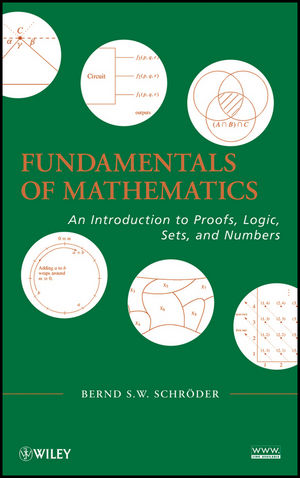Fundamentals of Mathematics: An Introduction to Proofs, Logic, Sets, and NumbersISBN: 978-0-470-55138-7
Hardcover
348 pages
August 2010
 This is a Print-on-Demand title. It will be printed specifically to fill your order. Please allow an additional 10-15 days delivery time. The book is not returnable.
|
||||||
Questions.
1 Logic.
1.1 Statements.
1.2 Implications.
1.3 Conjunction, Disjunction and Negation.
1.4 Special Focus on Negation.
1.5 Variables and Quantifiers.
1.6 Proofs.
1.7 Using Tautologies to Analyze Arguments.
1.8 Russell's Paradox.
2 Set Theory.
2.1 Sets and Objects.
2.2 The Axiom of Specification.
2.3 The Axiom of Extension.
2.4 The Axiom of Unions.
2.5 The Axiom of Powers, Relations and Functions.
2.6 The Axiom of Infinity and the Natural Numbers.
3 Number Systems I: Natural Numbers.
3.1 Arithmetic With Natural Numbers.
3.2 Ordering the Natural Numbers.
3.3 A More Abstract Viewpoint: Binary Operations.
3.4 Induction.
3.5 Sums and Products.
3.6 Divisibility.
3.7 Equivalence Relations.
3.8 Arithmetic Modulo m.
3.9 Public Key Encryption.
4 Number Systems II: Integers.
4.1 Arithmetic With Integers.
4.2 Groups and Rings.
4.3 Finding the Natural Numbers in the Integers.
4.4 Ordered Rings.
4.5 Division in Rings.
4.6 Countable Sets.
5 Number Systems III: Fields.
5.1 Arithmetic With Rational Numbers.
5.2 Fields.
5.3 Ordered Fields.
5.4 A Problem With the Rational Numbers.
5.5 The Real Numbers.
5.6 Uncountable Sets.
5.7 The Complex Numbers.
5.8 Solving Polynomial Equations.
5.9 Beyond Fields: Vector Spaces and Algebras.
6 Unsolvability of the Quintic by Radicals.
6.1 Irreducible Polynomials.
6.2 Field Extensions and Splitting Fields.
6.3 Uniqueness of the Splitting Field.
6.4 Field Automorphisms and Galois Groups.
6.5 Normal Field Extensions.
6.6 The Groups Sn
6.7 The Fundamental Theorem of Galois Theory and Normal Subgroups.
6.8 Consequences of Solvability by Radicals.
6.9 Abel's Theorem.
7 More Axioms.
7.1 The Axiom of Choice, Zorn's Lemma and the Well-Ordering Theorem.
7.2 Ordinal Numbers and the Axiom of Replacement.
7.3 Cardinal Numbers and the Continuum Hypothesis.
A Historical Overview and Commentary.
A.1 Ancient Times: Greece and Rome.
A.2 The Dark Ages and First New Developments.
A.3 There is No Quintic Formula: Abel and Galois.
A.4 Understanding Irrational Numbers: Set Theory.
Conclusion and Outlook.
Bibliography.
Index.



